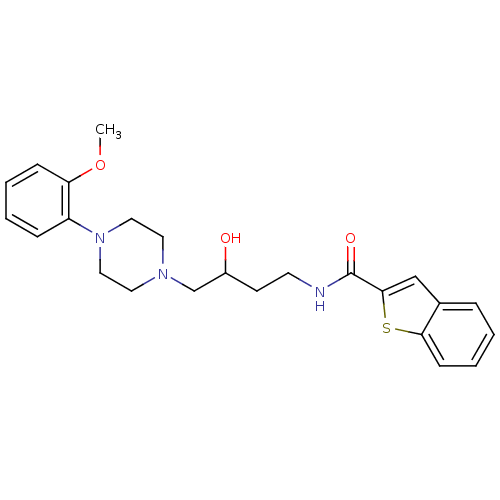BDBM50378002 CHEMBL1627320::US8748608, 39
SMILES COc1ccccc1N1CCN(CC(O)CCNC(=O)c2cc3ccccc3s2)CC1
InChI Key InChIKey=OUNYCNQDFAUREF-UHFFFAOYSA-N
Activity Spreadsheet -- Enzyme Inhibition Constant Data from BindingDB
 Found 4 hits for monomerid = 50378002
Found 4 hits for monomerid = 50378002
TargetD(3) dopamine receptor(Human)
The United States of America As Represented By The Secretary of The Department of Health and Human Services
US Patent
The United States of America As Represented By The Secretary of The Department of Health and Human Services
US Patent
Affinity DataKi: 4.60nMAssay Description:Methods for performing in vitro dopamine receptor binding studies are described in Huang et al. J. Med. Chem. 44:1815-1826 (2001) and Luedtke et al. ...More data for this Ligand-Target Pair
TargetD(3) dopamine receptor(Human)
The United States of America As Represented By The Secretary of The Department of Health and Human Services
US Patent
The United States of America As Represented By The Secretary of The Department of Health and Human Services
US Patent
Affinity DataKi: 4.60nMAssay Description:Displacement of [125]IABN from human D3 receptor expressed in HEK293 cellsMore data for this Ligand-Target Pair
TargetD(3) dopamine receptor(Human)
The United States of America As Represented By The Secretary of The Department of Health and Human Services
US Patent
The United States of America As Represented By The Secretary of The Department of Health and Human Services
US Patent
Affinity DataIC50: 39.1nMAssay Description:Antagonist activity at human D3 receptor expressed in HEK293 cells assessed as inhibition of quinpirole-stimulated mitogenesisMore data for this Ligand-Target Pair
TargetD(1A) dopamine receptor(Human)
National Institute On Drug Abuse-Intramural Research Program
Curated by ChEMBL
National Institute On Drug Abuse-Intramural Research Program
Curated by ChEMBL
Affinity DataKi: 6.65E+3nMAssay Description:Displacement of [3H]SCH23390 from D1 receptorMore data for this Ligand-Target Pair
